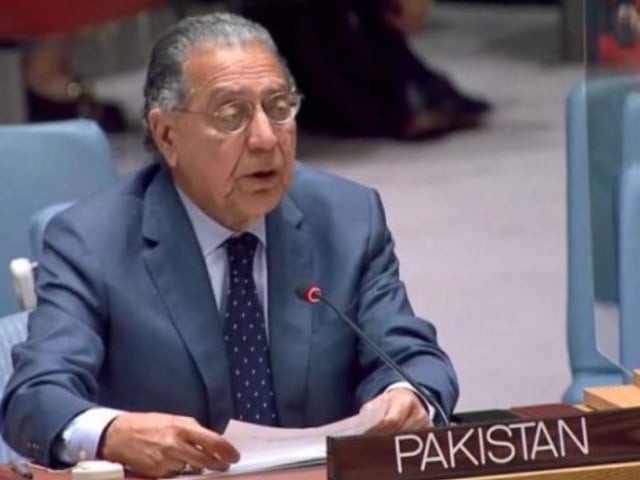Pakistan urges UNSC to decisively act against terrorism in Afghanistan
Ambassador Munir Akram highlights how terrorist groups like the TTP operate with impunity in Afghanistan

Pakistan's Permanent Representative to the United Nations Ambassador Munir Akram has called for decisive action against terrorism in the region while speaking at UN Security Council meeting on Afghanistan.
Adressing the event held in Qatar's Doha on Saturday, Ambassador Akram highlighted the dangers of allowing impunity for terrorist groups in Afghanistan.
He noted that despite progress by the Afghan Interim Government in combating Daesh (ISKP), several other terrorist organizations, including Al-Qaeda and Tehreek-e-Taliban Pakistan (TTP), continue to operate freely.
He stressed that socio-economic development in Afghanistan cannot be achieved as long as these groups remain active.
"The elimination of terrorism within and from Afghanistan remains the highest priority for the international community, Afghanistan's neighbours, and Afghanistan itself," stated Ambassador Akram.
Akram described the TTP as the most direct and serious threat to Pakistan, detailing the group's activities, which have resulted in hundreds of civilian and military casualties.
Despite Pakistan's repeated calls for action against the TTP, he pointed out that no significant measures have been taken by Afghanistan.
“Unfortunately, despite promises, no meaningful action has been taken so far. TTP safe havens remain close to Pakistan’s borders. Cross-border attacks have continued, including one by a TTP associate that killed several Chinese engineers working on the Dasu hydro power project,” the Pakistani envoy told the 15-member Council.
Ambassador Akram urged the UN Security Council to press the Afghan Interim Government to sever ties with the TTP, prevent cross-border attacks against Pakistan, disarm TTP terrorists, and hand over TTP leaders to Pakistan.
He emphasised the need for a realistic roadmap for Afghanistan's normalisation and integration into the global community, reaffirming Pakistan's commitment to work at bilateral, regional, and international levels to achieve sustainable peace and development in Afghanistan.
Ambassador Akram also reminded the international community of its obligation to assist the 23 million Afghans in urgent need of humanitarian aid.
For its part, the Pakistani envoy said the international community is obliged to help the 23 million Afghans who need urgent aid and to take adequate measures to bolster Afghanistan’s economy — including reviving the national banking system and restoring commercial activity.
The Taliban must also take steps to abide by its international obligations, he said, noting that “the world remains concerned” about restrictions imposed on women and girls in Afghanistan. “These do not conform with international law or the tenets of Islam”, he said, adding, “The AIG (Afghan Interim Government) is expected to ensure the rights of women and girls to education, work and other human rights.”
He stressed that reviving the Afghan economy and establishing pathways for sustained development are equally important.
"Pakistan enjoys close ethnic, cultural, historic, and religious bonds with Afghanistan, and promoting peace there is a national compulsion for Pakistan," he concluded.
Opening the debate, Roza Otunbayeva, Special Representative of the Secretary-General and Head of the United Nations Assistance Mission in Afghanistan (UNAMA), noted that the upcoming meeting in Doha, the third one in this format, is scheduled to take place in nine days and the Taliban have stated that they are preparing to attend.
“We hope that in Doha, key stakeholders will convene around the table, speak to each other face to face, reinforce the principles underlining the consensus to engage, and agree on next steps to alleviate the uncertainties that face the Afghan people”. But, she warned, Doha “has generated significant expectations that cannot realistically be met in a single meeting”.
While there is no substitute for engagement with Afghanistan, “it cannot be repeated enough that this sort of engagement is not legitimisation or normalisation”, Ms Otunbayeva added.
While the Taliban have maintained political stability, they continue to place severe restrictions on women, and there is little space for internal dissent.



















COMMENTS
Comments are moderated and generally will be posted if they are on-topic and not abusive.
For more information, please see our Comments FAQ